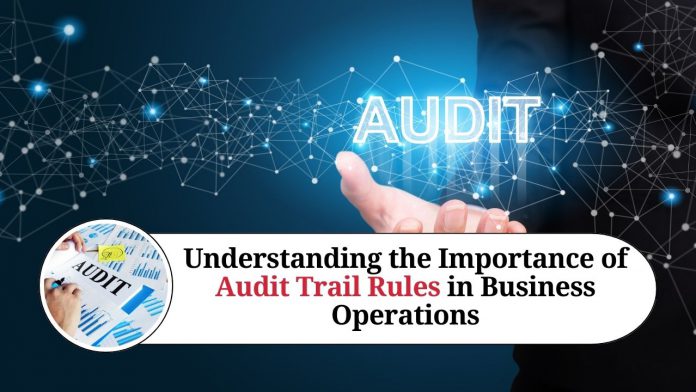In today’s digital world, data security is a crucial aspect of any business operation. Every business organization collects, processes, and stores sensitive information about its employees, customers, and stakeholders. With the increase in cyber threats and data breaches, it is vital for businesses to maintain proper audit trail rules to ensure the integrity, confidentiality, and availability of their data.
What is an Audit Trail?
An audit trail is a chronological record that shows who has accessed, modified, or deleted data within a system or application. It provides a complete history of all activities and changes made to a particular piece of data or information. Audit trails are essential for businesses to monitor user activities and identify any suspicious behavior or unauthorized access.
Importance of Audit Trail Rules
Audit trail rules are a set of guidelines and protocols that govern the collection, storage, and analysis of audit trail data. These rules ensure that the audit trail is accurate, complete, and secure. Here are some reasons why audit trail rules are essential for businesses:
- Compliance: Audit trail rules are necessary for businesses to comply with regulatory requirements such as HIPAA, GDPR, and SOX. These regulations mandate that businesses maintain proper audit trails to ensure the confidentiality, integrity, and availability of sensitive data.
- Data Security: Audit trail rules help businesses identify any security breaches, data theft, or unauthorized access to sensitive data. This information can help organizations take necessary actions to mitigate the risk of further data loss or theft.
- Accountability: Audit trail rules hold users accountable for their actions and provide a clear history of all activities related to a particular piece of data or information. This can help organizations identify any negligent or malicious behavior by employees or third-party vendors.
- Legal Evidence: Audit trail data can serve as legal evidence in case of litigation or disputes. It provides an irrefutable record of all activities related to a particular piece of data or information and can help organizations defend themselves in court.
Best Practices for Audit Trail Rules
Here are some best practices that businesses can follow to ensure effective audit trail rules:
- Define Clear Objectives: Define the objectives of the audit trail and identify the critical data elements that require monitoring.
- Implement Role-Based Access Control: Implement role-based access control to ensure that only authorized users can access sensitive data.
- Establish Retention Policies: Establish retention policies to determine how long audit trail data should be stored and when it should be disposed of.
- Implement Real-Time Monitoring: Implement real-time monitoring to detect any suspicious activity or unauthorized access to sensitive data.
- Regularly Review Audit Trail Data: Regularly review audit trail data to identify any unusual patterns or activities that may indicate a security breach or data theft.
In conclusion
audit trail rules are crucial for businesses to ensure data security, compliance, and accountability. By implementing effective audit trail rules, organizations can protect their sensitive data from cyber threats, identify any suspicious behavior, and comply with regulatory requirements. Therefore, it is essential for businesses to define clear objectives, implement role-based access control, establish retention policies, implement real-time monitoring, and regularly review audit trail data to ensure the integrity, confidentiality, and availability of their data.
Read more useful content:
- The Importance of Audit Trail and Logging for Organizations
- Applicability of Audit Trails
- What is Audit Trails
- Audit Trails: Importance and Limitations
Frequently Asked Questions (FAQs)
Q: What is an audit trail rule?
A: An audit trail rule is a set of guidelines and protocols that govern the collection, storage, and analysis of audit trail data.
Q: Why are audit trail rules important for businesses?
A: Audit trail rules are essential for businesses to ensure compliance, data security, accountability, and legal evidence.
Q: What is an audit trail?
A: An audit trail is a chronological record that shows who has accessed, modified, or deleted data within a system or application.
Q: What information is included in an audit trail?
A: An audit trail includes information such as the user ID, date and time of access, type of action performed, and any relevant data or information.
Q: What are some best practices for implementing audit trail rules?
A: Some best practices for implementing audit trail rules include defining clear objectives, implementing role-based access control, establishing retention policies, implementing real-time monitoring, and regularly reviewing audit trail data.
Q: What regulations require businesses to maintain proper audit trails?
A: Regulations such as HIPAA, GDPR, and SOX mandate that businesses maintain proper audit trails to ensure the confidentiality, integrity, and availability of sensitive data.
Q: How can businesses use audit trail data?
A: Businesses can use audit trail data to monitor user activities, identify any suspicious behavior or unauthorized access, and provide legal evidence in case of litigation or disputes.
Q: What are some common challenges in implementing audit trail rules?
A: Some common challenges in implementing audit trail rules include defining clear objectives, determining the critical data elements that require monitoring, and balancing data security with user convenience.




















